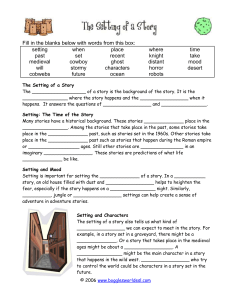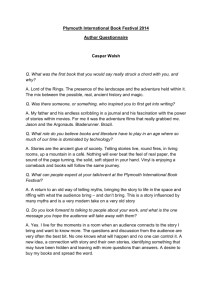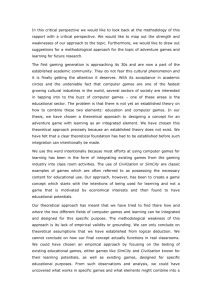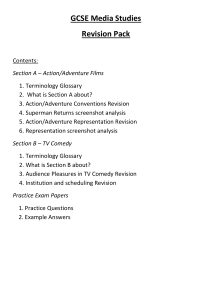Extract: “Your Highness” (2011) Micro Analysis The clip is from the
advertisement
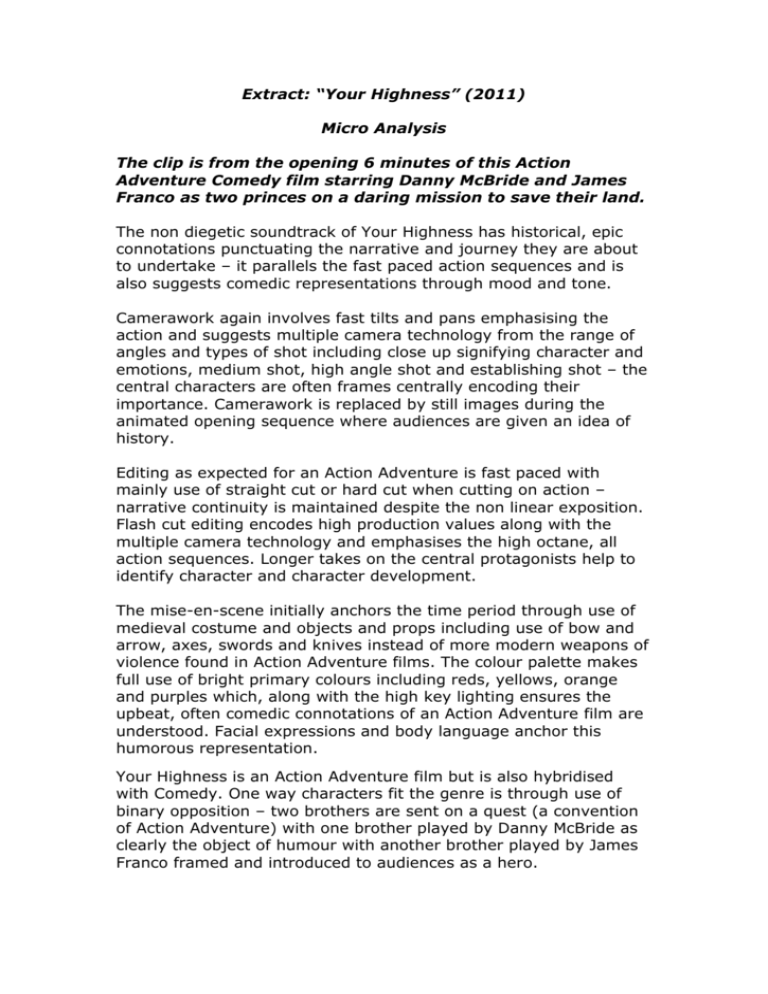
Extract: “Your Highness” (2011) Micro Analysis The clip is from the opening 6 minutes of this Action Adventure Comedy film starring Danny McBride and James Franco as two princes on a daring mission to save their land. The non diegetic soundtrack of Your Highness has historical, epic connotations punctuating the narrative and journey they are about to undertake – it parallels the fast paced action sequences and is also suggests comedic representations through mood and tone. Camerawork again involves fast tilts and pans emphasising the action and suggests multiple camera technology from the range of angles and types of shot including close up signifying character and emotions, medium shot, high angle shot and establishing shot – the central characters are often frames centrally encoding their importance. Camerawork is replaced by still images during the animated opening sequence where audiences are given an idea of history. Editing as expected for an Action Adventure is fast paced with mainly use of straight cut or hard cut when cutting on action – narrative continuity is maintained despite the non linear exposition. Flash cut editing encodes high production values along with the multiple camera technology and emphasises the high octane, all action sequences. Longer takes on the central protagonists help to identify character and character development. The mise-en-scene initially anchors the time period through use of medieval costume and objects and props including use of bow and arrow, axes, swords and knives instead of more modern weapons of violence found in Action Adventure films. The colour palette makes full use of bright primary colours including reds, yellows, orange and purples which, along with the high key lighting ensures the upbeat, often comedic connotations of an Action Adventure film are understood. Facial expressions and body language anchor this humorous representation. Your Highness is an Action Adventure film but is also hybridised with Comedy. One way characters fit the genre is through use of binary opposition – two brothers are sent on a quest (a convention of Action Adventure) with one brother played by Danny McBride as clearly the object of humour with another brother played by James Franco framed and introduced to audiences as a hero. The events in the opening sequence fit the classic Act 1 of an Action Adventure film with characters, setting and problem introduced. History is acknowledged and referenced with an epic journey needed to save the kingdom – both brothers are sent on a quest by their father which will comprise the narrative development in Act 2 and also arouse audience expectations of narrative predictability. Use of hyper real, cultural stereotypes are crucial to the genre conventions and narrative in the film – audiences identify with exaggerated representations as it helps to encode entertainment values and establish character. This is not only common to Action Adventure films but also to high production value Hollywood feature films distributed by major studios. Use of narrative binary opposition is used to represent characters to audiences e.g. strong, good looking hero versus overweight buffoon (the two brothers) but also the binary opposition of themes commonly represented in Action Adventure e.g. good versus evil. Fabious (Franco) is represented as the classic hero and is framed for the female gaze as he is shot in low angle (connotations of power) riding into the castle. Thadeous is represented as overindulgent and lazy as audiences see him pursued by dwarves in the opening sequence. This particular representation of dwarf actors used for the purposes of humour is not uncommon in Hollywood film and is a cultural stereotypes – debate has often centred around marginalisation and exploitation against commercial gain and entertainment. Charles Dance plays the stern, and authoritarian King Tallious who commands the brothers to undertake their quest; his age has connotations of wisdom. Female characters conform to stereotype and are sexualised and framed for the male gaze – this is evidenced in the opening sequence when a busty maiden is saved after nearly being put to the sword.
